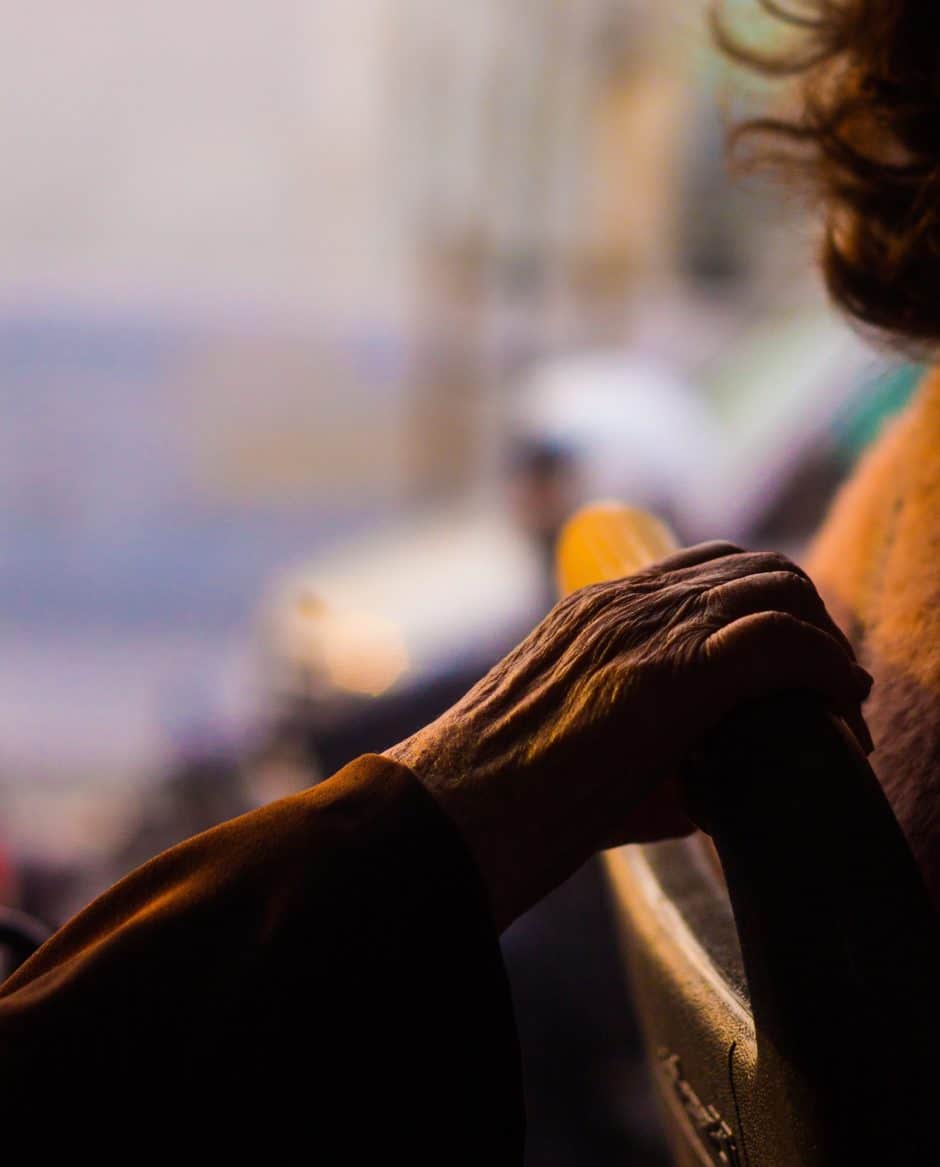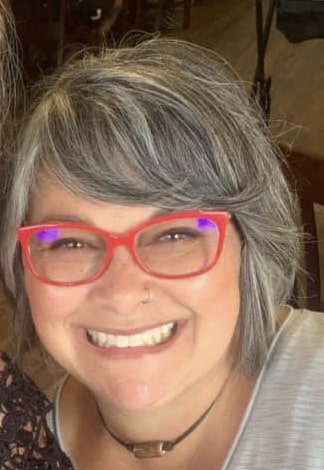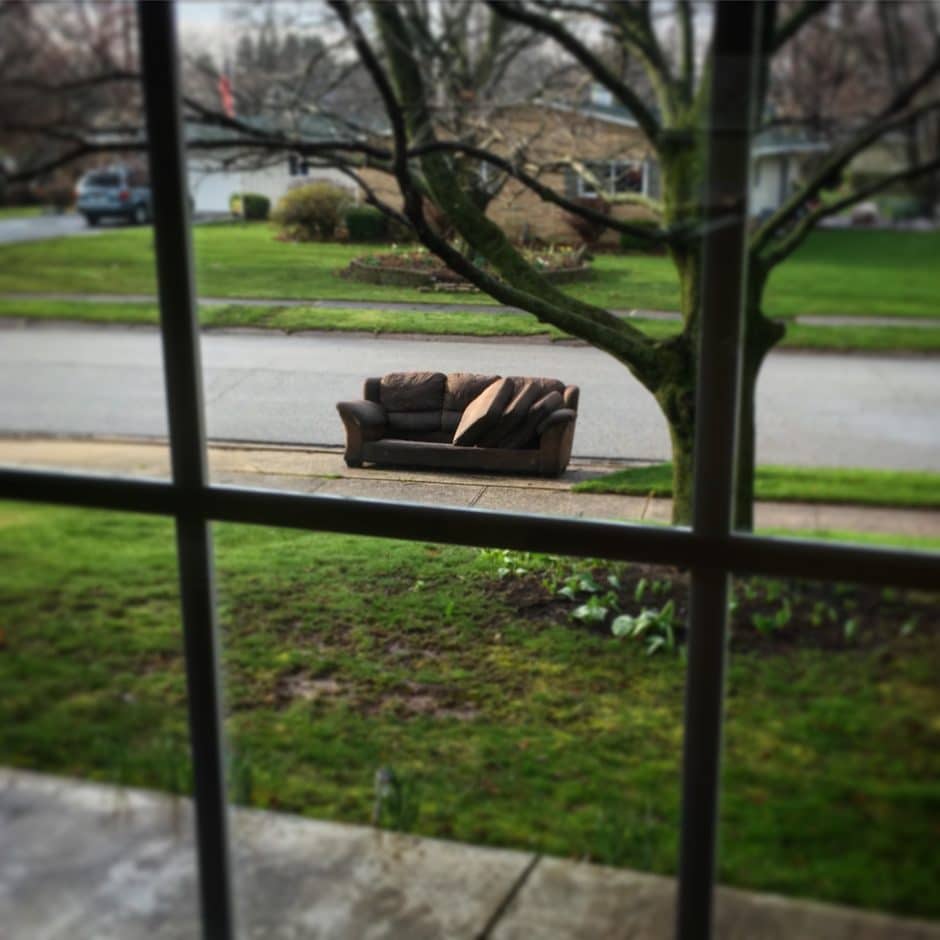Across the river, I catch a glimpse of High Falls peeking through the trees, all one-hundred-and-fifty magnificent feet of her. White water cascades down her granite face before crashing into the pool at her feet. The water settles as it makes its way downstream to meet up with her more famous sister, Triple Falls—the most popular waterfall hike near Asheville and where the movies The Hunger Games and The Last of the Mohicans were filmed.
As my ten-year-old golden retriever, Hope, and I rest on a rock at the river’s edge, the summer sun warms my face. Hope pants softly as she watches hikers hopping boulder to boulder beneath the towering falls. We’re midway through our Saturday hike on an August morning that feels more like fall. The weather is sunny and seventy degrees with a welcoming breeze. This is one of my favorite places to hike with Hope. Popular enough I don’t have to worry about hiking alone and still doable for my aging girl. The sound of running water permeates the trail. It’s a soothing soundtrack for this solo outing with my dog. A chance to escape life and get lost in nature for a few hours. To ground myself. To remember why I left suburban, stucco Southern California and moved here, to the mountains of Western North Carolina.
* * *
I’ve always felt drawn to the mountains, often quipping they’re my happy place. I feel different when I’m surrounded by nature. Calmer. Like I belong. A feeling that often escapes me in life and around people. When my kids were young, family vacations meant trips to National Parks where we’d submerge our suburban selves into nature. Yosemite, Rocky Mountain, Glacier, Zion, and Bryce Canyon are among my favorites. Those vacations were like a cleansing for my soul. A much-needed break for a busy working mom who struggled to balance her career and motherhood. A chance to spend time with my kids and husband doing something we all enjoyed, together.
When we visited Glacier National Park in Montana, my son was ten years old and he had us in stitches the entire trip. On every trail—except the last day or two when he’d had his fill of hiking—he belted out, Alamo! I can still picture his young face with eyes wide, brows raised, and lips pursed as the word escaped his mouth and echoed across the trail. What was that? Why did he keep saying it? Whatever it was, he was having a good time. Maybe he was simply expressing joy. Happy to be on vacation, in the mountains, or at least out of school.
Twenty-one years later I can still hear his child-like voice in my head, belting out, Alamo! It makes me chuckle. I asked my husband if he remembered the trip and if he knew what our son was saying, “I think he was saying a la mode,” he replied.
“Like pie with ice cream?” I asked.
“Yeah,” he said.
I decided to text my son and ask him, “When we were hiking at Glacier and you kept yelling out Alamo, were you saying Alamo or A la mode (like ice cream on pie) or something else?”
“Alamo like the battle in Texas,” he replied.
“Do you remember why you were saying it?”
“No idea why I did it at the time. I think I just thought it was fun to say.”
Still curious, I decided to do some research. At ten years old, he would have just completed fourth grade. It turns out fourth graders study The Alamo. Mystery solved!
My silly fourth grader is now thirty-one. He lives on an island in the Pacific Northwest, in an old house, surrounded by pine trees. He, too, prefers the peace, quiet, and elbow room to the crowded, hustle and bustle of Southern California.
* * *
Like my son, my dog Hope was born and raised in suburbia, but as soon as we arrived in Western North Carolina she settled right in like she’d been a mountain dog her entire life. Perhaps like me, and my son, she realized where she was born was not where she belonged. I’m quite confident if she could talk she’d say, Thanks for bringing me home. The same words my soul speaks. And a sentiment that’s still difficult to explain when people ask why we moved here. I don’t understand it myself sometimes. How do you, how can you explain why you feel more at home in a place where you have no roots than in a place you lived your entire life?
settled right in like she’d been a mountain dog her entire life. Perhaps like me, and my son, she realized where she was born was not where she belonged. I’m quite confident if she could talk she’d say, Thanks for bringing me home. The same words my soul speaks. And a sentiment that’s still difficult to explain when people ask why we moved here. I don’t understand it myself sometimes. How do you, how can you explain why you feel more at home in a place where you have no roots than in a place you lived your entire life?
Sitting here at the base of this roaring waterfall, with the pine and poplar trees soaring above me, their arms reaching high into the clear blue sky, I feel small. In a powerful, positive, humbling way. I felt that same smallness on those family vacations. Being surrounded by the immensity of nature provides perspective. Its beauty, grandeur, and steadiness are grounding, reassuring, and comforting.
As Hope sits next to me on our rock perch, the corners of her mouth are curled up in that quintessential golden retriever smile. The sun reflects off the water and onto her face, casting shadows that dance on her white muzzle, a feature that’s earned her the nickname Sugar Face. She, too, seems to enjoy this place. As I stroke the top of my old girl’s head, I contemplate the timeless beauty before us. I don’t know what it is about the enduring nature of nature that affects me so deeply. Perhaps there’s a sense of security in knowing it’s always there. Regardless of the ups and downs in life or the state of my psyche, nature is a constant. Always peaceful and beautiful. Always there to provide respite. And always ready to refuel my soul.
Perhaps that’s what drew me to these mountains five years ago. To a place where I don’t feel the weight of the world resting on my shoulders but that invites me to sit softly in her lap. With Mother Nature’s gracious arms wrapped around me, enveloping me, cradling me. Reminding me I don’t have to work so hard to make life happen.
I can let go, allow, and just be.












